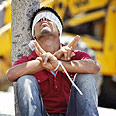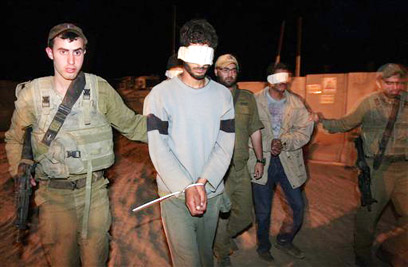
Report: Israel shackling detainees in painful ways
Public Committee Against Torture in Israel says different authorities in country systematically handcuff detainees in humiliating manners that in several instances rise to level of torture in violation of international law. IDF: Military police investigation launched in number of cases
The report is based on 547 cases of arrest by soldiers and dozens of interrogations by the Shin Bet in the past year, as well as additional cases from previous years. According to the report, the testimony of the detainees is supported by soldier testimony provided by the Breaking the Silence organization.
According to the PCATI, these figures are "surely only the tip of the iceberg" and the main victims of this practice are Palestinian security detainees, "yet the culture of contempt for the dignity of detainees gravitates inward towards Israeli society itself at times harming detainees who belong to other groups."
The report, entitled, “Shackling as a Form of Torture and Abuse,” was written by PCATI Advocate Samah Elkhatib Ayoub, who claims that the various security agencies in Israel shackle detainees in painful and humiliating manners that in a number of instances rise to the level of torture in violation of domestic law, High Court of Justice judgments, international law and accepted international standards of practice which allow for restraining for the purposes of preventing a detainee from escaping, or endangering himself or his surroundings.
In Israel, the report says, detainees are painfully shackled as a matter of practice. "Painful shackling is done for invalid and irrelevant reasons, which include causing pain and suffering, punishment, intimidation, and illegally eliciting information and confessions."

The report was published ahead of the UN International Day in Support of Torture Victims that is marked throughout the world on June 26.
'Detainee complains – soldier tightens cuffing'
The report presents a long line of testimonies from Palestinian detainees who were painfully shackled by soldiers, Shin Bet agents and at times prison guards. Many detainees, the report says, suffer from painful shackling at various stages during arrest, detention and interrogation and even while being transferred for medical treatment.In the segment dealing with the IDF, the report claims that soldiers tend to shackle detainees hands in a painful and harmful manner which begins at the time of arrest and lasts during their transfer to the various interrogation facilities.
According to the report, detainees are largely and systematically shackled behind their backs in combination with excessive tightening of the narrow plastic manacles, causing pain and at times lasting injury. Some of the detainees describe additional tightening of the plastic restraints with the obvious goal to causing additional suffering which is the usual answer to detainee's who complain about the pain.

"I shouted that my hands were hurting. One of the soldiers came up to me and asked what was wrong and why I was shouting," said Yazan Sawalha, a resident of Nablus who was arrested by the IDF and whose testimony is presented in the report. "I said that the handcuffing was very painful. Then he took a look at my hands. I thought he was going to unfasten the handcuffs but instead he twisted the knot even more and tightened the cuffing further."
'Detainees tied to chairs'
Another part of the report deals with the Shin Bet's interrogation facilities. Although the facilities are highly secured and there is no danger of escape, the report says, detainees are regularly shackled with their hands behind their backs, around the back of the chair upon which they are sitting, and it is not uncommon for them to be held in this position for hours at a time and even for days on end."Often the detainee is left in this manner in a locked interrogation room for hours at a time, even when he is not being interrogated. Shackling of this sort, when the body is contorted occasionally results in long-term damage," the report claims.
"This practice cannot be justified by the concerns for the safety of the interrogators or prevention of escape attempts offered by officials. The unacceptability of this claim is further demonstrated in light of the fact that these detainees – restrained in interrogation chambers – are brought before police interrogators so that they can take their confession while the detainee is left unrestrained. These facts leave no room for doubt: Painful shackling is designed to break the interrogee's spirit and to illegally extract a confession or information from him.
"In addition, there are occasions when the Shin Bet interrogators will shackle the interrogee in an additional pair of manacles that are fastened on the forearm or on the upper arm and which the interrogators then pull on in a manner that is clearly designed to cause intolerable pain."
The report includes the story of an interrogee who was restrained by his hands and feet to a cot for two consecutive days without even being interrogated and denied access to the lavatory, forcing him to relieve himself in his clothes.

Report includes series of recommendations (Photo: AP)
"(One of the interrogators) brought very narrow metal handcuffs, tightened them on my arms above the elastic bandage, and turned them strongly around the arm," said east Jerusalem resident Haytham Ibrahim Salhab, who was interrogated in the Russian Compound. "I felt he was turning the bone, as if the bone was separating from the flesh of my arm.
"He did this separately to each arm, alternately – first the right hand then the left… I shouted out loud because it was very painful. And each time I shouted he shouted louder in my ear, yelling in my right ear as he turned the handcuffs on my right arm, and vice versa."
Need for documentation
Although the report points to improvements in practices and procedures concerning the shackling of detainees when they are brought for medical treatment – following actions taken by PCATI and Physicians for Human Rights – security detainees are said not to benefit from these improvements.Rather, the report says, they continue to receive medical treatment in hospitals while they are shackled, uniformly with no consideration of the threat they may or may not present.
The report contains a number of detailed recommendations to the different authorities, including a call to cease the blanket shackling of detainees which does not take their individual situation into consideration.
In instances in which there is a justification to shackle the detainee, the report says, it must be done in such a manner that does not cause pain and which is proportional to the need. PCATI also calls for the enforcement of the law and to bring to justice those who violate the law, and their superiors, and to allow for independent monitoring mechanisms in Shin Bet interrogator centers.
The report's authors also call for documentation via video and audio of the interrogations so that it will be possible to supervise them and have information in inquiries into complaints of painful shackling and other forms of torture and ill treatment during interrogation.
Reponse: These are dangerous people
The IDF Spokesperson's Unit said in response that "the IDF is acting in accordance with international law and the laws of the State of Israel, and meets all the obligating rules in terms of the detention of terror activists and wanted men.
"The IDF's policy is to strictly maintain the safety and wellbeing of all detainees, from the moment they are captured and held by the army. The IDF views with severity any unnecessary harm caused to detainees, fundamentally examined every claim on harm caused to detainees, and acts with all severity of the law in the required cases.
"In accordance, complaints made with the IDF in regards to painful shackling and have been looked into and examined by the prosecution for operation affairs, and in several cases an order was given to launch a military police investigation. These days, a Central Command team led by an officer at the rank of colonel is working to examine all the procedures in dealing with Palestinian detainees."
The Shin Bet said in response, "Most of the people interrogated by the Shin Bet are suspected of serious terror offenses. Naturally, these are very dangerous people, and a significant number of them are eventually convicted and sent to long years in prison.
"Past experience shows that people interrogated for security offenses have not hesitated before attacking the service's interrogators and causing real injuries. Cuffing detainees suspected of security offenses is a necessity. The claim that shackling interrogees is meant to get them to break down and confess illicitly is unfounded."
The security organization added that "in 2008, with the purpose of making it easier for interrogees, the Shin Bet decided to extend the handcuff chains used to bind security detainees, without significantly harming the interrogators' safety or increasing the risk of the interrogee escaping.
"This was reported to the Public Committee Against Torture, but for some reason was not included in its press release. It should also be noted that any complaint made by an interrogee or on behalf of an interrogee in regards to pain caused due to cuffing by the Shin Bet is examined, and the complainant receives notice on the findings of the examination."










